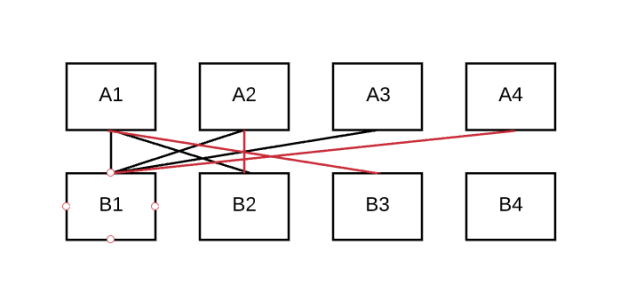LC address: Find K Pairs with Smallest Sums
You are given two integer arrays nums1 and nums2 sorted in ascending order and an integer k.
Define a pair (u,v) which consists of one element from the first array and one element from the second array.
Find the k pairs (u1,v1),(u2,v2) …(uk,vk) with the smallest sums.
Example 1:
Given nums1 = [1,7,11], nums2 = [2,4,6], k = 3 Return: [1,2],[1,4],[1,6] The first 3 pairs are returned from the sequence: [1,2],[1,4],[1,6],[7,2],[7,4],[11,2],[7,6],[11,4],[11,6]
Example 2:
Given nums1 = [1,1,2], nums2 = [1,2,3], k = 2 Return: [1,1],[1,1] The first 2 pairs are returned from the sequence: [1,1],[1,1],[1,2],[2,1],[1,2],[2,2],[1,3],[1,3],[2,3]
Example 3:
Given nums1 = [1,2], nums2 = [3], k = 3 Return: [1,3],[2,3] All possible pairs are returned from the sequence: [1,3],[2,3]
Analysis:
首先对题目进行分析,为了方便,我用Ai来表示nums1[i],用Bi来表示nums2[i]。我们可以知道[Ai, Bj]永远比[Ai+m, Bj+n]小(m+n>0)。换句话说,如果[Ai, Bj]还没有被排进list,那么[Ai+m, Bj+n]永远不可能被考虑加入list。再换句话说,在任意一个时刻,对于每一个Ai(Bi),最多只需要考虑一种组合。根据这个分析的结果,我的想法是,控制一个集合S,里面包含所有当前会被考虑排进list的组合,每次在其中选出和最小的,并更新这个集合。
为了不那么抽象,我决定用图片辅助说明,不妨有A={A1, A2, A3, A4}以及B={B1, B2, B3, B4}。假设在某一时刻,list={[A1, B1], [A2, B1], [A3, B1], [A1, B2]}。下图中黑色线条代表已经加入list的组合,红色代表当前需要被考虑的组合,也就是S={[A1,B3], [A2, B2], [A1, B3]}。

那么这个组合怎么得到呢?其实规律很简单,对于每一个Ai,如果在list中和Ai组合的最大数字为Bj,那么只需要考虑[Ai, Bj+1];如果[Ai, B1]进了list,而[Ai + 1, B1]还没有进list,那么需要考虑[Ai + 1, B1]。
根绝这个思路,那么可以设计算法,既然每次我们都需要找S中最小的组合来加入list,很容易就想到用一个PriorityQueue来储存和更新S。到了这一步,基本也就解决了这道题,只需要再考虑edge cases就可以了。
不过依我对于LC test cases的尿性的了解,以及我多年来谨慎小心的作风,我觉得LC很可能在一些小的edge cases来阴我。对于这道题,容易想到,如果我们对于两个int求和(或者做差),可能会有overflow(underflow)的问题,所以我当即为我的机智点了赞,然后哼哧哼哧地把很多地方的int换成了long。然后我就一遍AC,心情大好,心想毕竟是心思缜密的我啊!但是我是一个强迫症,想看看不改成int会有什么结果,然而依旧AC!(╯‵□′)╯︵┻━┻ LC你太让我失望了,test cases写得这么马虎,怎么对得起我付的钱?!还钱!
Solution:
solution 1 : 简约版
public class Solution {
public List<int[]> kSmallestPairs(int[] nums1, int[] nums2, int k) {
List<int[]> list = new ArrayList<>();
if (nums1 == null || nums1.length == 0
||nums2 == null || nums2.length == 0) {
return list;
}
PriorityQueue<int[]> pq = new PriorityQueue<>(new Comparator<int[]>() {
public int compare(int[] pair1, int[] pair2) {
return nums1[pair1[0]] + nums2[pair1[1]]
- nums1[pair2[0]] - nums2[pair2[1]];
}
});
int[] temp = new int[2];
pq.add(temp);
int count = 0;
while (k > 0 && !pq.isEmpty()) {
temp = pq.poll();
int[] res = new int[2];
int i1 = temp[0];
int i2 = temp[1];
res[0] = nums1[i1];
res[1] = nums2[i2];
list.add(res);
if (i1 + 1 < nums1.length) {
temp[0] = i1 + 1;
pq.add(temp);
}
if (i1 == 0 && i2 == count && count + 1 < nums2.length) {
count += 1;
int[] newArray = new int[2];
newArray[1] = count;
pq.add(newArray);
}
k -= 1;
}
return list;
}
}
solution 2 : 深思熟虑谨小慎微然后并没有什么卵用版
public class Solution {
public List<int[]> kSmallestPairs(int[] nums1, int[] nums2, int k) {
List<int[]> list = new ArrayList<>();
if (nums1 == null || nums1.length == 0
||nums2 == null || nums2.length == 0) {
return list;
}
PriorityQueue<long[]> pq = new PriorityQueue<>(new Comparator<long[]>() {
public int compare(long[] pair1, long[] pair2) {
if (pair1[2] == pair2[2]) {
return 0;
}
if (pair1[2] < pair2[2]) {
return -1;
}
return 1;
}
});
long[] temp = new long[3];
temp[2] = (long) nums1[0] + (long) nums2[0];
pq.add(temp);
int count = 0;
while (k > 0 && !pq.isEmpty()) {
temp = pq.poll();
int[] res = new int[2];
int i1 = (int) temp[0];
int i2 = (int) temp[1];
res[0] = nums1[i1];
res[1] = nums2[i2];
list.add(res);
if (i1 + 1 < nums1.length) {
temp[0] = i1 + 1;
temp[2] = (long) nums1[i1 + 1] + nums2[i2];
pq.add(temp);
}
if (i1 == 0 && i2 == count && count + 1 < nums2.length) {
count += 1;
long[] newArray = new long[3];
newArray[0] = 0;
newArray[1] = count;
newArray[2] = (long) nums1[0] + nums2[count];
pq.add(newArray);
}
k -= 1;
}
return list;
}
}
Solution code can also be found here: https://github.com/all4win/LeetCode.git
配图详细,代码简单易懂,这位博主很有想法!
LikeLike